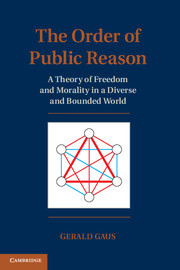Crossref Citations
This Book has been
cited by the following publications. This list is generated based on data provided by Crossref.
Thrasher, John J.
2013.
Reconciling Justice and Pleasure in Epicurean Contractarianism.
Ethical Theory and Moral Practice,
Vol. 16,
Issue. 2,
p.
423.
Lister, Andrew
2013.
The “Mirage” of Social Justice: Hayek Against (and For) Rawls.
Critical Review,
Vol. 25,
Issue. 3-4,
p.
409.
Swaine, Lucas
2013.
Moral Character for Political Leaders: A Normative Account.
Res Publica,
Vol. 19,
Issue. 4,
p.
317.
Glod, William
2013.
Against Two Modest Conceptions of Hard Paternalism.
Ethical Theory and Moral Practice,
Vol. 16,
Issue. 2,
p.
409.
Platz, Jeppe von
2014.
Are economic liberties basic rights?.
Politics, Philosophy & Economics,
Vol. 13,
Issue. 1,
p.
23.
Caputi, Mary
2014.
The Encyclopedia of Political Thought.
p.
3186.
Da Silva, Michael
2014.
Public Reason and the Need to Identify State-Relevant Desert.
Criminal Justice Ethics,
Vol. 33,
Issue. 2,
p.
129.
Rossi, Enzo
2014.
Legitimacy, Democracy and Public Justification: Rawls’ Political Liberalism Versus Gaus’ Justificatory Liberalism.
Res Publica,
Vol. 20,
Issue. 1,
p.
9.
Stemplowska, Zofia
2014.
Sen's Modest Justice.
Jurisprudence,
Vol. 5,
Issue. 2,
p.
376.
Allard-Tremblay, Yann
and
Bandini, Aude
2014.
La fonction constructive de la délibération : de l’accord à l’ajustement.
Philosophiques,
Vol. 40,
Issue. 2,
p.
321.
Bird, Colin
2014.
Coercion and public justification.
Politics, Philosophy & Economics,
Vol. 13,
Issue. 3,
p.
189.
Danaher, John
2014.
Skeptical theism and divine permission: a reply to Anderson.
International Journal for Philosophy of Religion,
Vol. 75,
Issue. 2,
p.
101.
Jörke, Dirk
2014.
The Encyclopedia of Political Thought.
p.
3046.
Danaher, John
2015.
Responsible Innovation 2.
p.
245.
MULDOON, RYAN
2015.
Expanding the Justificatory Framework of Mill's Experiments in Living.
Utilitas,
Vol. 27,
Issue. 2,
p.
179.
Wren-Lewis, Sam
2015.
Well-Being in Contemporary Society.
p.
17.
Danaher, John
2016.
The Threat of Algocracy: Reality, Resistance and Accommodation.
Philosophy & Technology,
Vol. 29,
Issue. 3,
p.
245.
von Grundherr, Michael
2016.
Order Ethics: An Ethical Framework for the Social Market Economy.
p.
79.
Sachs, Benjamin
2016.
III—Contractarianism as a Political Morality.
Proceedings of the Aristotelian Society,
Vol. 116,
Issue. 1,
p.
49.
Vallier, Kevin
2016.
In Defence of Intelligible Reasons in Public Justification.
The Philosophical Quarterly,
Vol. 66,
Issue. 264,
p.
596.





